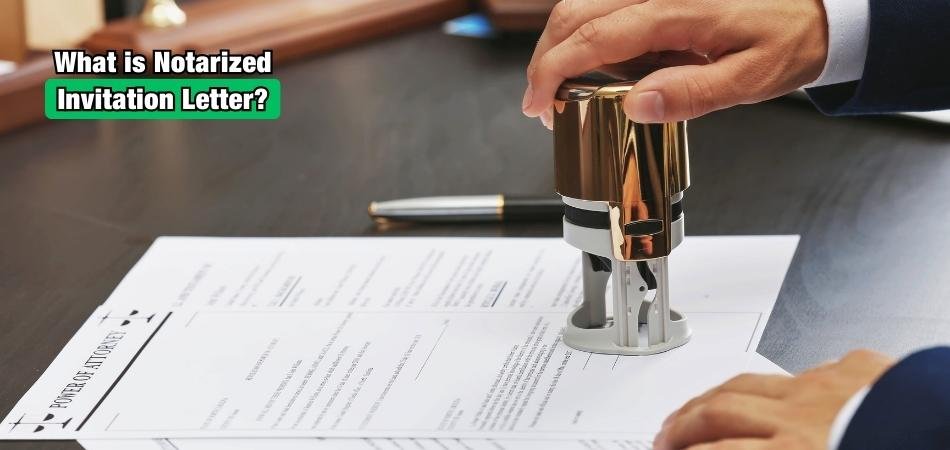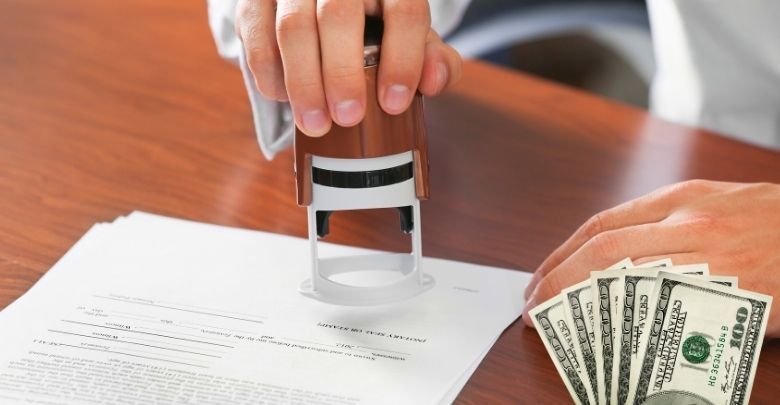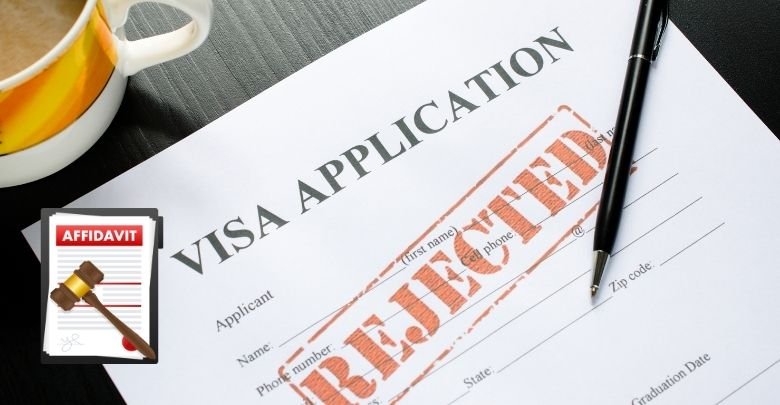Your cart is currently empty!

If you’re planning international travel, you might need a notarized invitation letter, especially when visiting certain countries for events or personal reasons. This document is often required to meet official regulations and support the purpose of your visit. So, what is notarized invitation letter?
A notarized invitation letter is a formally authenticated document verifying the invitee’s commitment and purpose for inviting someone to a country. This notarization adds legal credibility, helps simplify visa processes, and provides an extra layer of trust for immigration authorities, showing that the invitation is genuine and clearly described.
Curious about how this letter can make your travel process easier or when you might need one? Keep reading; this article covers everything you need to know, from the benefits of notarization to common mistakes to avoid and how to handle rejections.
Why Do You Need an Invitation Letter?
In some countries, attending conferences or events frequently requires an invitation letter. This document shows that the event organizer expects you and confirms your purpose for visiting. Many people find it helps with the visa application process, as it verifies your attendance.
With an invitation letter, immigration officers can better understand the purpose of your travel. This is crucial when you are entering a country for a specific reason. Attending conferences often involves travel to new regions, so proper documentation ensures a smooth process.
An invitation letter also helps confirm your professional or academic intentions for travel. When you attend an international conference, organizers may provide a formal invitation letter. This letter supports your credibility and helps you avoid travel-related issues with authorities.
Suppose you’re attending an international conference in Canada with invitation letter. It will ease the visa process and show proof of your travel purpose. Many Canadian conferences issue these letters to help attendees with documentation. It makes entry simpler and clarifies your conference participation.
What is Notarized Invitation Letter?
A notarized invitation letter offers a secure and credible way to invite someone to a foreign country, providing an official document that validates the invitation. This letter holds several essential benefits, enhancing trust and easing international travel.

Legal Validation
By notarizing an invitation letter, you confirm its authenticity legally. Embassies and consulates often favor notarized documents, as they reduce the risk of forgery or misrepresentation. This recognition makes the visa application process easier and less complicated. Legal validation adds an extra layer of trust, making authorities more willing to approve visa requests.
Simplifies Visa Approval Process
A notarized invitation letter gives the traveler the legitimate justification that visa officers seek when granting entry. It shows the inviter’s commitment and willingness to host the visitor, supporting the reason for travel. This reduces questioning by immigration authorities and helps applicants get their visa approval without delays. The clear, verifiable intent in a notarized letter simplifies the approval process.
Enhances Credibility
A notarized invitation letter adds credibility by confirming that the inviting party genuinely supports the invitee’s travel purpose. This reassures the immigration officers and increases the invitee’s chance of obtaining a visa. Such credibility also assures the invitee that they are entering the country with a trustworthy document, meeting all required regulations and guidelines.
Reduces Risk of Fraud
By using a notary public to confirm identities and legal information, a notarized invitation letter lowers the risk of fraud. Notaries ensure both the inviter and invitee are who they claim to be, confirming their information. This step protects both parties and ensures that the document is legitimate, minimizing the chances of fraudulent intentions and misuse.
Strengthens Travel Purpose
The letter clearly outlines the purpose of the visit, whether for business, tourism, or family matters. A notarized document helps immigration officers understand the travel intention better, supporting the invitee’s application. This clarity improves the chances of a successful application, as the purpose is stated directly and backed by a legal document, making it more reliable.
Provides Assurance to the Host Country
When a notarized invitation letter is submitted, it assures the host country that the visitor will follow all regulations. It also shows that the inviter will take responsibility for the invitee during their stay, building trust. This assurance gives authorities confidence that the invitee respects the host country’s legal requirements, helping to reduce security concerns.
Simplify Customs and Immigration Clearance
A notarized invitation letter helps with customs and immigration clearance, as officers recognize its legitimacy. When arriving at customs, invitees can show the notarized letter if questioned, proving they have a valid reason for their stay. This document can smooth entry processes, reducing delays or additional questioning during arrival at the airport or border.
Establishes Transparency Between Parties
Clear intentions and expectations for the visit are established by a notarized invitation letter, and transparency builds trust. This document confirms that both the inviter and invitee fully understand and agree on the trip’s purpose. Notarized letters remove any ambiguity, ensuring a smooth process. Transparent communication helps build a strong foundation for a successful visit.
A notarized invitation letter offers practical advantages, including credibility, security, and simplified processing, making it a valuable asset for international travel. With this document, travel becomes a straightforward and trustworthy process, benefiting both the inviter and the invitee.
When is a Notarized Invitation Letter Necessary?
An invitation letter may need notarization under certain situations. Notarizing provides legitimacy and makes the letter more official. With a notarized invitation letter, you can show your intentions and provide support for the invitee. Let’s explore when notarization might be necessary:

Legal Requirement for Visa Applications
An official invitation is occasionally needed for visa applications in order to confirm a host’s willingness to assist the invitee. Notarizing the invitation letter gives extra validity, assuring immigration authorities that the host and guest genuinely plan the visit. Notarized letters are often required in countries with strict immigration controls to prevent misuse of travel documents, increasing the chances of visa approval.
For Business or Professional Purposes
Notarized invitation letters are helpful when inviting someone for business purposes, like conferences or work projects. They demonstrate that a company formally recognizes the visit, showing proof of the invitee’s purpose and the host’s accountability. Immigration authorities, consulates, or even business partners may need assurance that the visit is official and not for casual purposes.
Support for Family or Friends Visits
The invitation might need to be notarized if the visit involves extended stays or sponsorship. By notarizing, the host shows that they will provide accommodations or financial support. In some countries, immigration authorities expect a formal invitation to prevent fraudulent visa applications, adding validity to the invitation and confirming family ties.
Educational or Research Invitations
Academic or research visits may require a notarized invitation to confirm the institution’s invitation and commitment. Schools, universities, and research institutes sometimes need formal letters for visa applications or entry into facilities. A notarized letter highlights the host institution’s involvement and assures authorities that the visitor has official backing for research or study activities.
Legal and Financial Accountability
When inviting someone for events with potential legal or financial obligations, notarized invitations become valuable. A notarized letter serves as documented proof that the host intends to bear certain responsibilities. This extra step adds weight to the letter, assuring that the host will assist if needed, especially in situations where there may be financial or legal involvement.
Notarizing an invitation letter can add credibility, meet legal requirements, and support visa applications. It provides assurance to authorities, making the travel process smoother for guests and hosts in various situations.
The Process of Getting an Invitation Letter Notarized
A few essential procedures must be followed in order to notarize an invitation letter, which makes it a safe and legally acceptable document for visa applications. This process builds trust, enhances credibility, and aligns with official requirements, especially for those visiting for specific purposes. Here’s how it works:

Preparing the Invitation Letter
Before notarization, create a clear, professionally formatted letter that includes all necessary details about the inviter, invitee, and visit purpose. The letter should clearly state names, addresses, and the reason for the visit. For those traveling for a conference, it’s important to clarify the purpose of the invitation letter, which helps immigration authorities understand and validate the visitor’s intent.
Scheduling a Notary Appointment
Once the letter is ready, schedule an appointment with a certified notary. Notaries are often available at banks, post offices, and other institutions, offering flexible locations for convenience. In this meeting, the notary will verify your identity, so ensure you bring valid identification. This step guarantees the letter’s authenticity in official visa evaluations.
Verifying Identities and Documents
During the notary meeting, the notary will check the invitee’s identification and the letter’s contents. They confirm the letter aligns with legal standards and that all parties involved are legitimate. For visa officials, this verification enhances document credibility, ensuring the invitee genuinely aligns with the stated purpose of their visit, which might include a conference or event.
Notary Stamp and Signature
The notary applies their stamp and signature, officially validating the invitation letter. This step certifies the letter as legally recognized, and essential for presenting it at visa interviews or consulate visits. The notarization stamp signifies that the document is genuine and supports the invitee’s purpose, which, when linked to official events or conferences, becomes even more impactful.
Obtaining the Notarized Invitation Letter
Once the notary has completed their process, you will receive the notarized invitation letter with a stamp or seal verifying the authenticity. After notarization, you can include the letter in your visa application, as the purpose of a conference invitation letter in visa applications is to explain your travel.
Submission to Visa Authorities
With the notarized letter, submit it to the appropriate visa authorities as part of your visa application. Presenting a notarized letter reinforces the legitimacy of the invitee’s purpose for travel, whether visiting family, business, or attending a conference. Visa officials view notarized documents more favorably, increasing approval chances and easing the application process.
Getting an invitation letter notarized is a straightforward but essential process that enhances the letter’s trustworthiness and supports visa approval. Following these steps ensures the invitation letter meets legal standards, making it valuable for both the inviter and the invitee.
What Documents Do You Need to Notarize an Invitation Letter?
When preparing to notarize an invitation letter, it is essential to have all the required documents ready. These documents ensure that the notarization process goes smoothly and meets all necessary legal requirements. Be well-prepared for the process by gathering everything needed.
- Valid Identification: Notaries require an official ID, such as a passport or driver’s license, to confirm your identity and verify the letter’s legitimacy before proceeding.
- Draft of Invitation Letter: Ensure the invitation letter is clearly written, detailing the purpose, invitee’s details, and planned visit timeline to provide clarity and avoid misunderstandings.
- Proof of Residency or Address: Bring a recent utility bill, lease agreement, or bank statement as proof of your residential address, helping to establish authenticity.
- Legal Status Documentation: For certain invitations, proof of legal status like a visa or residence permit may be necessary to verify your eligibility as an inviting party.
- Any Supporting Documents: Travel or employment records, if required, can reinforce the purpose of the invitation, showing legitimacy and intent, which aids in notarization.
- Notarization Fee Payment: Some notaries charge a fee for services, so be prepared with payment to avoid delays and streamline the notarization process.
To successfully notarize an invitation letter, make sure you have each document ready and organized. This preparation ensures a smoother notarization experience, as every detail matters in creating a valid, official invitation.
How Long Does It Take to Notarize an Invitation Letter?
There are multiple steps involved in getting an invitation letter notarized, and the time frame can change depending on a few factors. Some cases may see quick results, while others might take longer. Let’s explore the details below for a clearer picture.
Service Provider’s Process
Each service provider has a unique process for notarizing invitation letters. Some may offer same-day service, while others take longer, depending on their workload and internal procedures. If extra documentation is required, this can lead to a delay, making the entire process take a bit longer.
Document Verification Requirements
Before notarization, the provider reviews documents like identification and the invitation letter itself. This ensures all details are accurate and complete. If there are any discrepancies or missing information, it may require additional time to resolve before the notarization can be officially completed.
In-Person Versus Remote Notarization
Choosing between in-person and remote notarization can influence the time it takes. In-person notarization often requires scheduling, while remote notarization might be quicker, depending on the service provider. However, remote notarization may not be available in all situations, especially for international documents.
Demand and Availability of Notary
Notary availability affects the time it takes to complete the notarization. During peak periods or in areas with fewer notaries, you may need to wait longer. Scheduling in advance can help avoid unnecessary delays, particularly if the notary’s services are in high demand at certain times.
Additional Verification Steps
Certain notarizations require more verification steps, especially for international invitations. Notaries may need to confirm specific legal requirements or cross-check details, which can add extra time. It’s essential to prepare for potential additional verification to avoid unexpected delays in the process.
A notarized invitation letter can take varying times based on different factors. Planning ahead and understanding these details can help you get through the process with more ease. With the right preparation, you’ll be ready to handle any waiting period confidently.
How Much Does It Cost to Get an Invitation Letter Notarized?
The cost of notarizing an invitation letter can vary depending on several factors. Service providers, location, and document requirements all influence the final price. Knowing these aspects will help you prepare and budget for the notarization process effectively. More details are provided below.

Service Provider Fees
Each notarized signature usually costs $5 to $15, depending on the notary’s location and level of experience. Some may offer discounts for multiple signatures or documents. Remote notarization services often have set fees, which can range from $25 to $50 per document.
Location of Notary
Notarization fees can differ based on location. In large cities, the cost may range from $10 to $20, while in smaller towns, the price may drop to between $5 and $10. In high-demand areas, fees may rise, especially during busy seasons or holidays.
Type of Notarization Service
In-person notarization services can cost between $10 and $30, depending on the notary’s rates. For remote notarization, expect fees of around $25 to $50 per document. Online services are often more affordable, though some may charge extra for expedited services or verification requirements.
Additional Services or Requirements
The price may go up if additional services are required, such as document certification or legal review. Additional charges may range from $5 to $25 per extra service. Some notaries may charge higher fees for international notarizations, which can add up to $50 or more in some cases.
Notary’s Experience and Reputation
Highly experienced or renowned notaries may charge more for their services. These professionals could charge between $20 and $50 per notarization. Their reputation and expertise may justify the higher costs, but you should evaluate whether it’s worth the added expense for your specific needs.
Knowing the factors that influence the cost of notarizing an invitation letter helps ensure that you are prepared financially. By considering all relevant aspects, you can avoid unexpected expenses and manage the process with ease.
Mistakes to Avoid When Notarizing an Invitation Letter
When notarizing an invitation letter, it’s important to avoid certain mistakes that could cause delays or rejection. Ensuring accuracy and following proper guidelines is essential for a smooth process. Keep these common pitfalls in mind:
- Missing Required Information: Important details, such as full names, addresses, and dates, should be included. Omitting any essential information can lead to confusion or rejection.
- Inaccurate Signatures: Ensure that all required signatures are completed correctly. A signature that does not match official records may invalidate the letter.
- Not Including Proof of Identity: Some notarization processes require proof of identity. Make sure you provide proper identification when submitting the invitation letter to avoid complications.
- Wrong Notary Jurisdiction: Notarizations need to be done within the jurisdiction where the document will be used. Avoid notarizing in a place that doesn’t align with the intended location.
- Using an Unqualified Notary: It’s vital to select a licensed notary to ensure the document is valid. Avoid using a notary without proper credentials or authority.
- Unclear Purpose of the Letter: Be clear about the purpose of the invitation letter. Vagueness or unclear intentions can raise doubts about the legitimacy of the invitation.
- Failing to Follow Local Laws: Each country may have specific notarization rules. Always check the local laws before notarizing to ensure compliance and prevent delays.
Avoiding these mistakes when notarizing your invitation letter is crucial for a smooth process. By being mindful and ensuring all details are correct, you can help avoid unnecessary setbacks in your application process.
What to Do if Your Notarized Invitation Letter is Rejected?
If your notarized invitation letter gets rejected, it can be frustrating and stressful. Understanding the reasons for rejection can help you move forward and reapply. By following a few steps, you can improve your chances of approval. Here’s what you need to do:

Identify Reasons for Rejection
Firstly, find out why the invitation letter was rejected. Immigration authorities or embassies usually provide reasons for their decisions. Common reasons could include incomplete details, unclear intent, or lack of proper documentation. Knowing these issues can help you correct them before you reapply.
Seek Guidance from Authorities
Consulting the embassy or consulate is a helpful step after rejection. They can explain the reasons for rejection and provide advice on how to fix them. A detailed discussion may help clarify the documents needed for a successful application, especially if issues related to the supporting paperwork or specific rules of the host country.
Make Necessary Adjustments
After understanding the reasons for rejection, make appropriate changes to your invitation letter. If the rejection mentioned missing information, provide complete details, such as financial support or itinerary. Making your letter stronger can improve approval chances by eliminating previous doubts and addressing any potential gaps in your documentation.
Seek Professional Advice
If you continue to face challenges, seeking help from a lawyer or visa expert can be useful. They have experience with similar issues and can provide specific guidance. These experts can assist in properly drafting your invitation letter or providing the correct steps to get invited to an international conference without unnecessary delays.
Double-Check Documentation
Ensure you verify all documents before submitting them again. Check for accurate information, matching dates, and necessary signatures. Including documents that back up your claims, such as proof of relationship or accommodation, may improve credibility. Properly organizing your documents shows readiness and can help overcome the initial rejection.
A rejected invitation letter isn’t the end. By addressing issues, seeking guidance, and adjusting your approach, you increase your chances of approval, ensuring smoother application processes for future invitations and international opportunities.
Frequently Asked Questions
Notarized invitation letters are essential documents in various travel scenarios, adding legal validation and easing the visa process. Below are some frequently asked questions to help clarify the purpose, requirements, and process involved in notarizing invitation letters.
Do All Countries Require a Notarized Invitation Letter?
No, not all countries require a notarized invitation letter for entry, as requirements vary based on the destination’s immigration laws. While some countries may accept standard invitation letters, others may mandate notarization, especially for family or business visits. Always check the specific visa requirements for your destination.
How Long is a Notarized Invitation Letter Valid?
A notarized invitation letter is generally valid for the duration specified within the document or until the visit occurs. It’s essential to check with the visa-issuing authorities, as some countries may have specific expiration guidelines. Often, notarized documents are most valid within three to six months.
Can a Notarized Invitation Letter Be Used for Multiple Entries?
Typically, a notarized invitation letter is intended for a single entry, especially if tied to a specific event or visit. For multiple entries, you may need to clarify this requirement in the letter or issue separate letters. Always verify with immigration authorities to avoid entry issues on future visits.
Where Can I Find a Qualified Notary for My Invitation Letter?
Qualified notaries can be found in various locations, such as banks, law offices, and local government buildings. Some countries also offer remote notarization services, allowing you to notarize documents online. Confirm the notary’s qualifications to ensure they meet legal requirements for international travel documents.
Does a Notarized Invitation Letter Guarantee Visa Approval?
A notarized invitation letter does not guarantee visa approval, as it’s only one part of the application process. Immigration authorities consider other factors, like financial stability, travel history, and the purpose of the visit. However, a notarized letter can strengthen your application and improve the chances of a successful outcome.
Bottom Line
Your travel plans will be significantly eased if you have a notarized invitation letter, which adds credibility and meets specific immigration requirements. By having one, both you and your host demonstrate a clear, legitimate purpose, making the visa application smoother and more straightforward.
For those wondering, what is notarized invitation letter? Simply put, it’s an invitation letter verified by a notary public, which makes the document legally recognized. This notarization provides additional validation to the invitation, giving immigration officials confidence in the invitee’s intentions and reducing processing issues.
To ensure success with your notarized invitation letter, remember to double-check all required information, follow each step carefully, and consult a professional if needed. Wishing you safe travels and success in your application process!

Leave a Reply